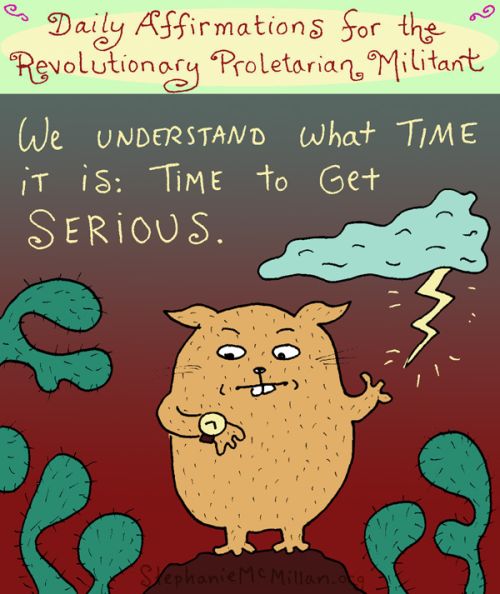
by Deep Green Resistance News Service | Mar 21, 2016 | Strategy & Analysis
By Stephanie McMillan / One Struggle
This essay originally appeared in Idées Nouvelles Idées Prolétariennes. Featured artwork by Stephanie McMillan
Individualism is the ideology of competition, of capitalism. It consists of prioritizing one’s perceived immediate personal interests above collective interests, and being blind to the fact that one’s long-term personal interests actually correspond to the interests of the whole. This leads people to behave in ways that are detrimental to the collective, and ultimately to each individual as well.
Under capitalism, society does not meet the needs of the people, and we are structurally prevented from meeting our needs collectively. Capitalism’s engine is competition. There is competition between classes as well as within classes. Within the working class, the capitalist system pits each person (or family) against all others in a struggle for survival.
Humans are social animals who, before agriculture arose and society was divided into classes, lived in bands. Our species evolved with a natural tendency to cooperate. But when people living under capitalism attempt to express this tendency, they are sharply discouraged. For example, when strangers spontaneously assist one another after a disaster, they are quickly dispersed and ordered to leave this task to the state.
The capitalist class holds ideological hegemony (dominance and control) over the whole society. They exert constant pressure to shape our ideas, thoughts, and emotions in ways that serve them. Therefore, unless we make a conscious contrary effort, the ideologies that serve this dominant class are spontaneously felt as “normal” or “natural.”
Individualism is a powerful ideological weapon that the capitalist class (the bourgeoisie) uses to crush the subjectivity of the working class (the proletariat), and thus to prevent the potential liberation of the world from capitalist rule. Individualism is promoted and fortified by every possible cultural and economic means. We are indoctrinated from birth. Parents are compelled to teach their children to survive in the competitive framework (which they have no choice about living in) by “getting ahead,” to “look out for number one,” to put oneself in the best position possible (i.e., through education, or seeking a rich mate) to accumulate wealth for personal security.
Individualism is the ideology of the petit bourgeoisie (those who circulate capital by selling either services or goods, who tend to aspire to belong to the ruling class). It manifests itself as the striving for market power, for personal advancement, for comforts, for security and stability within the framework of the system. In contrast, proletarian ideology seeks to overturn the capitalist system and meet our needs collectively. But capitalism has been able to indoctrinate even members of the working class in petit bourgeois ways of thinking, to manipulate them into acting against their own interests, in ways that benefit capitalists instead.
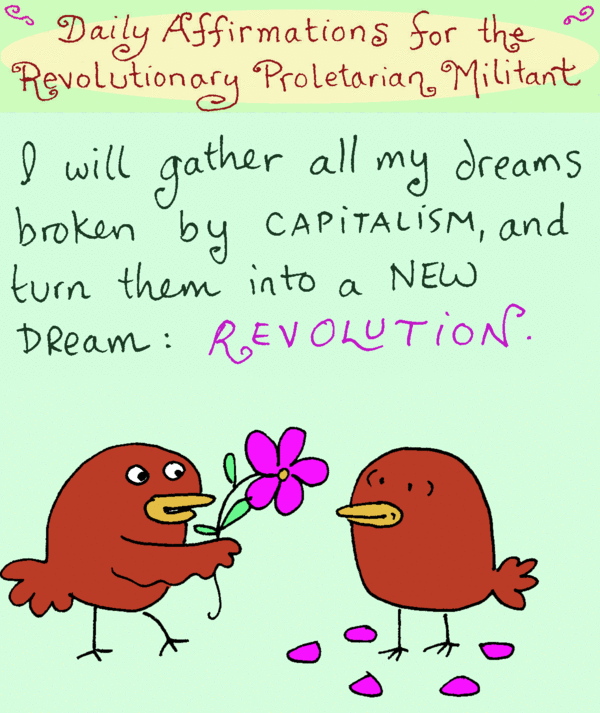
Artwork by Stephanie McMillan
As proletarian militants, we are no less subject to ideological domination than anyone else. The difference is that we are consciously aware of it, to varying degrees, and thus we are able to combat it. In order to fight the system, we must fight its dominant ideologies at every level: in society as a whole, in our organizations, and in our own individual hearts and minds.
This is an active and constant process of struggle. It will continue even after the ruling class has been defeated politically— we are so deeply conditioned that it may take generations to uproot their poisonous ideas. Ultimately, it will require that we construct a society (an economy, in particular) that retains no structural or social mechanism for rewarding individualism.
We should not be ashamed to discover individualism in our own hearts, or shame others for manifesting it— it is inevitable in capitalist society. Instead, the way to fight it is to bring it to light, examine it in relation to our overall political goals, and then consciously reject it (over and over again, as it will constantly re-arise).
Ideological strength requires an underpinning of political unity; these advance together. The motive for struggle on the ideological front is not to serve some abstract morality, but to achieve a specific political goal.
Individualism is not the same as individuality. Combatting individualism does not mean that everyone must be identical (which is impossible anyway) or that anyone should suppress their own thoughts, desires, or particular characteristics. On the contrary, we must recognize the value of each individual as inherent, and at the same time as it relates to the collective. Each person has specific strengths to contribute to our common work, and these should be enhanced and supported. Our weaknesses should be shared so we can help each other overcome them. We appreciate diversity and differences among us, which contribute to a dynamic social/political life, increasing our range of possibilities in action and thought. (In fact, for any motion to occur at all, in a dialectical process, differences are required, by definition). In groups, as in any aspect of the natural world, diversity ensures resilience, flexibility, adaptability, and evolution.
In order to struggle against individualism, we must recognize its manifestations. In political organizations, there are many ways that this destructive ideology materializes. They include (not exclusively) these 12 common types:
1) Misplaced priorities. Nothing is as important and urgent as crushing capitalism. Nothing. Countless lives will continue to be destroyed until we accomplish this task. The future existence of all life on Earth is at risk as long as this system exists. Everything we do should be, in some way, in service to our cause. Of course our basic needs must be met, which beyond self-reproduction (subsisting) also include maintaining one’s health and balance (mental, emotional, physical, social and cultural). These should support and renew our capacity to contribute to revolution. Even if we eliminate frivolous activities from our lives, we still have to make difficult choices about how we spend our time, because the system keeps us very busy in our effort to survive and meet our responsibilities. (This overload is intentionally devised so we are too overwhelmed to resist). Therefore we have to constantly evaluate how much energy we give to particular activities, make correct choices even when they are painful, and order our lives in favor of the revolutionary struggle.
2) Competition among ourselves. This can involve using one’s experience, knowledge, accomplishments, abilities or personality to gain personal power or prestige, and to repress the collective will. Instead, we should all strive to strengthen our collective democratic functioning by assisting each comrade to express her/himself, to overcome weaknesses, build strength, and maximize participation. We should struggle among ourselves within a framework of overall unity, in order to discover the truth together, and not attempt to impose one’s own will over others (whether their disagreements are verbalized or silent), or monopolize any aspect of work. Individual power without collective power is useless and can never defeat our enemy.
3) A lack of commitment. In order to increase consumption of commodities, capitalist society obsessively pushes self-indulgence as an ideal. (“Because you’re worth it.”) It has created concepts of “comfort,” “fun” and “satisfaction” that correspond to their economic need for us to buy things. Whatever doesn’t please us in the moment, we are encouraged to abandon and replace. This leads to a market-based approach to life, including toward nature, love, spirituality, political work, and everything else. Unfortunately, political work is not comfortable, fun, and instantly gratifying in the ways that we are conditioned to desire. Instead it is challenging, complex, and requires immense persistence. When this fact is discovered, a common response is to abandon it.
4) Laziness. Some people believe they’ve performed a great deed by joining an organization and declaring support for the cause. They stop here, congratulating themselves and posting revolutionary quotations all over Facebook. But this is like confusing the starting point in a marathon with the finish line. We can’t stand on unearned laurels, but have to run the full distance: to do the hard work of constructing theory, defining a political line, and building organizations—pushing ourselves through to victory and beyond.
5) Passivity. Letting others always take the lead, and refusing to take initiative (once a collective approach has been decided) is an avoidance of responsibility. Each person should strive to participate and contribute to the maximum of her/his potential, to express ideas without fear, and be willing to do whatever work is necessary.
6) Hero/martyr complex. While it’s essential to work to one’s maximum capacity and strive to increase it, it can be tempting to overestimate what one’s capacity actually is. A juggler with too many eggs will drop some of them. Similarly, taking on too many tasks and making too many commitments will result in failure to carry all of them out. Unreliability leads to uncertainty and paralysis for the other members of an organization, who have interconnected tasks that depend on one another for success. In addition, it could cause the person to burn out, rendering them totally ineffective. Instead of attempting personally to handle every task, we should help others share responsibilities. We have to accept that some tasks will not be accomplished (as well or at all) until sufficient collective capacity is built.
7) Defensive/aggressive ego. In a collective endeavor, criticism should never be personal; thus there is no reason to be personally offended by it. We should not only be willing to listen to criticism with an open mind, but to welcome constructive criticism, and learn to evaluate our own work in the spirit of understanding our weaknesses in order to overcome them. Criticism of the work of a comrade or ally should always be offered in a constructive manner, with the intention of assisting their work. An alternative should be suggested along with it. We should not pick each other apart for every small mistake (which can be very demoralizing), but focus on fundamental issues.
8) Self-expression. Intellectuals (especially in academia) attempt to generate novel ideas for professional or “personal branding” purposes, rather than focusing on constructing theory to concretely assist class struggle. This is theory for theory’s sake, or intellectualism. This practice converts theory into just another commodity, a gift to our enemy. The way to combat this is to produce our ideas (in whatever form) collectively. For artists, the concept of “art for art’s sake” is a way to justify creating work without political or social content. This means squandering one’s creativity and skills by offering them for the benefit of the ruling class, instead of for the working class. Intellectuals and artists should participate in other areas of political work, or they won’t fully understand their subjects.
9) Self-esteem. Working hard is good, but not so good if there is an underlying motive of elevating one’s own social position or being the center of attention. We do not need to build our self-esteem by seeking admiration, praise and flattery. Our self-respect and sense of connection should come from being an effective social agent for our class, connected to countless others within a historical process. We should appreciate one another as comrades, and let each other know when we’re doing good work, but not be motivated by a desire for public recognition.
10) Friend sourcing. Because of the atomization of our society, and consequent feelings of isolation, sometimes people join and use organizations as a means to alleviate loneliness, to make friends or develop relationships, whereas it should be the other way around: allowing friendships to arise from a foundation of political unity. If the personal aspect of a relationship is made primary over the political aspect, this can interfere with political functioning. Political agreement or disagreement can be falsely based on emotion. Underlying conflicts can manifest as personal attacks hidden under the guise of political disagreements, picking quarrels, harassment, or avoidance of common work because of discomfort. This creates a negative atmosphere which can sidetrack people’s attention and undermine group cohesion. There is no room for drama in political organizations. We should focus on our overall goal, and be good comrades first, friends second.
11) Liberalism. Tolerating destructive behavior because one doesn’t like conflict or want to “rock the boat,” allows that behavior to continue and increase. Manifestations of liberalism include gossiping behind people’s backs instead of bringing up problems collectively, failing to take opportunities to assert revolutionary ideas in appropriate situations, witnessing (or being subject to) oppressive acts or speech without saying anything, failing to hold comrades accountable, supporting or attacking views based on feelings about the person expressing them, and tolerating mediocrity in our work. These all result in an unprincipled peace that can lead to group apathy.
12) Going off the rails. The members of a revolutionary organization act only within the framework of political unity. Strength comes from disciplined collectivity, and individual initiative must be based on this foundation. Taking action as an individual in ways that have no relationship to collectively agreed-upon strategy or goals can be dangerous. For example, committing an illegal act (impulsively or from a concealed plan) without the knowledge and agreement of the collective, puts others at risk, damages collective work, and destroys mutual trust. Failing to take the safety of the organization seriously and to abide by its security protocols is inexcusable.
Everything in capitalist society is geared to stop us from organizing to fight for revolution. We feel constant pressure to cave in to individualism. We are tempted with possibilities for self-advancement if we abandon the struggle, or are threatened with the opposite if we don’t fall in line. If we insist on rejecting individualism, this can cost us our jobs. Friends may tell us we’re crazy, boring, or depressing to talk to. Our family members might tell us that we are failing in our responsibilities to them when we devote time to political work. On TV and in movies, we are given poisonous models of human behavior.
Resisting all these influences is class struggle on the ideological front. We have to keep our bearings, pick our battles wisely, and refuse to kneel down under pressure. In our organizations, we must assist one another to overcome individualism and all enemy influences.
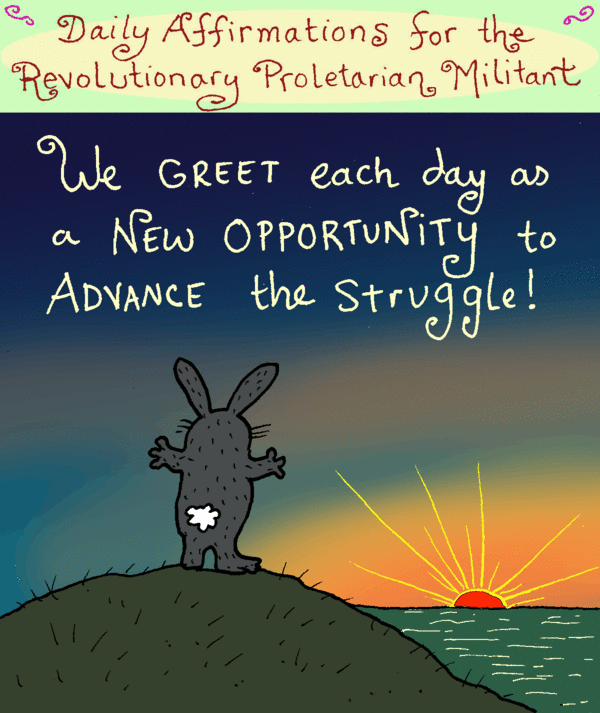
Artwork by Stephanie McMillan
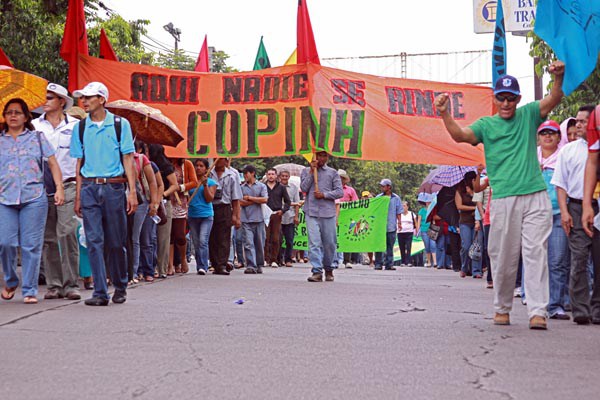
by Deep Green Resistance News Service | Mar 19, 2016 | Repression at Home
Featured image: COPINH march in Honduras, from elmundo.cr
By Cultural Survival
On March 15, 2016, Nelson Garcia, a member of the same Indigenous rights group as Berta Caceres was assassinated in Honduras. Garcia was killed by four gunshots to the face in the Rio Chiquito community, less than two weeks after Caceres’ murder.
Both were outspoken members of the Civic Council of Popular and Indigenous Organizations of Honduras (COPINH). Garcia had been involved in a land dispute to reclaim Indigenous lands in Rio Chiquito along with 150 families who were members of COPINH. On March 15, 100 police officers, 20 military police, and 10 soldiers were sent to evacuate the area.
“They said that they would be peaceful and they were not going to throw anyone out of their houses, but at midday they started to tear down the houses, they destroyed the maize, the banana trees and the yucca plantations,” said Tomas Gomez, a COPINH coordinator. “When they finished the eviction, our companion Nelson Garcia went to eat in his house, they were waiting in the zone that the commission of COPINH to pass, but it was diverted. Garcia arrived first and they killed him,” he added.

Nelson Garcia
It is not clear who was behind the killing. Outraged human rights groups in Honduras have demanded the protection of COPINH members since the assassination of Caceres. Garcia was the father of five children and leader of the community in Rio Chiquito. Human and environment rights activists are regularly targeted in violent attacks in Honduras. At least 116 environmental and human rights defenders were killed in 2014, according to Global Witness, but many suspect that number to be much higher.
COPINH has issued the following statement:
The assassination of our comrade Nelson García and the eviction of the community of Río Chiquito are additional elements of the war against COPINH that seeks to end our more than twenty-two years of work defending, resisting, and constructing.
Today’s aggressions are additional elements of the large quantity of threats, aggressions, assassinations, intimidations and criminalizations directed against COPINH.
Since the assassination of our comrade Berta Cáceres we have been the target of a large number of that show there is zero interest on the part of the Honduran state in guaranteeing our lives and the work that we perform, as well as disregard for the mandates of the IACHR in terms of the application of the precautionary measures that have been granted us. The precautionary measures were granted March 6th, and now, nine days later, they’ve killed one of our comrades.
How could anyone expect us to trust the investigative process of the state that criminally harasses the leadership of the organization by announcing that it is under investigation for presumed participation in the murder, while not investigating the sources of the threats?
How could anyone expect there would be justice in the case of our leader Berta, when the measures necessary to protect her family are not guaranteed, and the daughters and companions of our comrade Berta have been followed by an armed man in the city of Tegucigalpa during their meetings with the authorities?
Since the very day of Berta’s assassination, the installations of COPINH in La Esperanza have been under surveillance by unknown persons, intimidating those who remain in resistance following in the footsteps of our leader.
In the same way the comrades of the community of Río Blanco have suffered aggressions and persecution when they went to the city of Tegucigalpa to make their case in front of entities such as the Ministry of the Interior and the diplomatic representatives of the G16.
Also there was an incident in which the comrades of the community went to the Río Gualcarque and were assaulted with shotgun blasts by the security guards of the hydroelectric project Agua Zarca, fortunately without injuring any members of the community.
All of these aggressions are part of a plan for the extermination of our organization and we call for national and international solidarity to fight back.
We demand an end to the persecution, harassment, and war against COPINH.
We demand that the Honduran state answer for the deaths of our comrades and that there be no more impunity.
We demand justice for our comrade Berta Cáceres.
With the ancestral force of Lempira, Mota, Etempica, Berta, our voices rise full of life, justice, and peace.
Berta’s alive, the struggle thrives!
La Esperanza, Intibucá, Honduras. Done on the 15th day of the month of March, 2016.
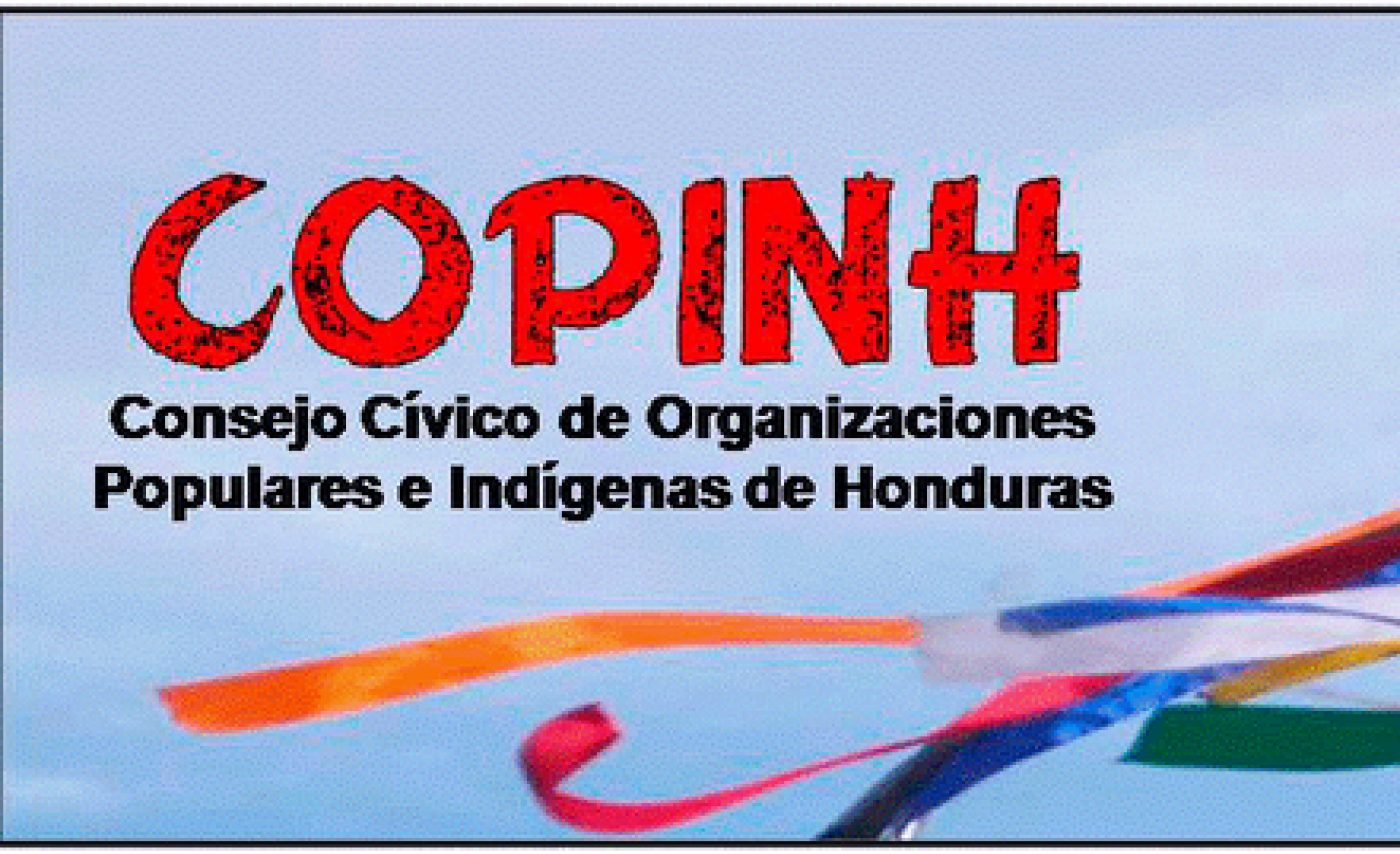
Via Campesina has also reported that violence in Honduras since Berta’s death has skyrocketed: “In the last few weeks the situation has worsened greatly with the proliferation of hired assassins aiming to take the lives of those who demand land to produce food, of those who struggle against extractivism, dams, and agribusiness.”
Other recent violence includes:
· Assassination attempt of Cristian Alegría in front of La Vía Campesina in Tegucigalpa. Cristian is the cousin of Rafael Alegría, Coordinator of La Vía Campesina Honduras and currently a member of the Honduran Congress for the Libre Party.
· Harassment of the president of MUCA (Unified Movement of Aguan Farmers), Juan Ángel Flores, who was arrested in the department of Colón, falsely accused of links to drug trafficking. The lack of evidence forced authorities to release him hours later.
· Detention of public defender Orbelina Flores Hernández, member of the Permanent Human Rights Observatory of the Aguan, accusing her of involvement in land conflicts.
· Sentencing of David Romero, journalist of Radio Globo, to 10 years in prison. David’s investigative reporting had exposed embezzlement of social security and other acts of corruption in Honduras, involving the ruling party, that gave rise to tens of thousands taking to the streets last year.
· Forcing Mexican environmental activist Gustavo Castro Soto — the sole witness to Berta’s assassination and himself injured during the shooting — to stay in Honduras for 30 days despite fears for his safety.
Cultural Survival joins hundreds of organizations in encouraging the international community continue to speak out against this violence.
Take action here
Read more: 6 Things You Can Do to Put Your Anger into Action for #BertaCaceres (March 10)
by Deep Green Resistance News Service | Mar 17, 2016 | Pornography
By Jonah Mix / Deep Green Resistance
This article originally appeared in Feminist Current.
Last month, the Journal of Sex Research published “Is Pornography Really About ‘Making Hate to Women?’” a paper claiming to find a positive correlation between pornography consumption and feminist attitudes. In its abstract, the Canadian researchers behind the study waste no time making their disdain for radical feminism clear:
“According to radical feminist theory, pornography serves to further the subordination of women by training its users, males and females alike, to view women as little more than sex objects over whom men should have complete control. Composite variables from the General Social Survey were used to test the hypothesis that pornography users would hold attitudes that were more supportive of gender nonegalitarianism than nonusers of pornography. Results did not support hypotheses derived from radical feminist theory. Pornography users held more egalitarian attitudes—toward women in positions of power, toward women working outside the home, and toward abortion—than nonusers of pornography. Further, pornography users and pornography nonusers did not differ significantly in their attitudes toward the traditional family and in their self-identification as feminist. The results of this study suggest that pornography use may not be associated with gender nonegalitarian attitudes in a manner that is consistent with radical feminist theory.”
Of course, news outlets have already jumped on the study as proof of radical feminism’s pearl-clutching prudery. But these smug liberals, like the researchers themselves, are mistaken about basic feminist theory. The radical anti-pornography position doesn’t claim men who watch porn are necessarily more misogynistic than men who don’t — only that pornography is a common and effective way men are indoctrinated into misogyny.
Other, equally effective methods for cultivating woman-hate still exist, and most men who don’t watch porn happen to be under the influence of the biggest one around: Religious conservatism. When you take a look at the thousand different ways men might learn to hate women, it becomes obvious that “Men who use porn are less sexist than men who don’t” and “Porn doesn’t make men sexist” are two completely different statements. Drug addicts who use cocaine probably live longer than drug addicts that use heroin. That doesn’t make cocaine good for you.
But this study doesn’t even ask its stupid question well. For one thing, they define a porn user as anyone who has “viewed an X-rated film in the preceding year.” What does that even mean? The vast majority of porn today is watched in short clips online, and most people don’t use either “X-rated” or “film” to describe them. There’s no way of knowing how men taking the survey interpreted the question; I can imagine quite a few porn users wouldn’t consider their fifteen minutes spent on Porn Hub as constituting an “X-rated film.”
It’s also an unacceptably broad standard for declaring people porn users. Under this metric, someone who masturbates to Facial Abuse twice a day is counted as equal with a dude who clicked a sidebar ad for Girls Gone Wild nine months ago. Both are unequivocally wrong, but it’s ridiculous to put them in the same category when you’re doing a study like this. The far more reasonable approach would be to measure frequency of porn use against sexist attitudes and look for a correlation.
This vague language and deceptive grouping are problems, but the study moves from flawed to futile when you look at their measure for sexism. The researchers used four data points as criteria: Support for women in positions of power, support for women working outside the home, support for abortion, and self-identification as a feminist. Really, researchers? That’s your definition of sexism?
If this were 1960, sure, it would be reasonable to gauge misogyny by asking about women having careers and abortions. It would also be reasonable to gauge racism by asking about segregated lunch counters. But neither set of questions would say anything about the world in 2015, when misogyny (and racism, for that matter) have been proudly wed to a rudderless liberalism that embraces those supposed markers of progress.
It’s very, very easy to hate women while still believing they should work outside the home (because Jesus Christ, get off your asses and do something, ladies!) or get abortions (because raising kids is a drag, but who wants to wear a condom?). Even women in positions of power get a stamp of approval from plenty of patriarchs, so long as they pledge to keep the same woman-hating laws in place. Remember Sarah Palin, anybody?
Questions about women working outside the home or holding office might screen for cartoonish patriarchs, but they give a free pass to the average misogynist. The only people who really reject these basic rights are hardcore religious conservatives — who also make up the large majority of men who never watch porn! This reflects a fundamental flaw in this study that borders on unethical: The researchers selectively defined sexism with standards that were most likely to be fulfilled by those in the category of non-porn users. Dozens of other criteria that might catch equally sexist liberal dudes in the porn-using camp were completely ignored.
With all this in mind, the actual thrust of the study is fairly weak. All it purports to show is that men who consume pornography often hold “egalitarian attitudes.” Shaky methodology aside, I don’t doubt that’s true. It’s not shocking to hear that the average porn user, when asked, will tell you he has an “egalitarian attitude” towards the women he uses as masturbation aids. It’s just shocking that these researchers think such an insipid declaration has anything to do with feminism.
Egalitarianism and misogyny aren’t incompatible. In fact, with the exception of some conservative holdouts, the vast majority of anti-feminism today comes from this supposedly worthwhile “egalitarian attitude” — you know, the one that excuses a woman’s sexual exploitation because, hey, she consented; laughs off domestic violence because, if women are equal, that means men can hit them; and eliminates women’s health and social services because you don’t want anyone getting special treatment, do you?
Developing a real understanding of the relationship between pornography, male power, misogyny, and violence requires more than a few yes or no questions. Asking men to self-report if they think women are human beings is not a good way to understand misogyny, and measuring “egalitarian attitudes” is not a good way to gauge a commitment to aiding women’s liberation. This study does have something to teach us, but it’s not that men who watch porn are more likely to be feminists — it’s that a definition of feminism based in “egalitarianism” is so meaningless, even porn-sick men can claim it.
Jonah Mix is a member of Deep Green Resistance and an anti-pornography activist. He runs the blog Gender Detective at Jonahmix.com.
by DGR News Service | Mar 15, 2016 | Listening to the Land
Featured Image: Abandoned mill near Sorrento, Italy, by Jason Wallace
Derrick Jensen / Deep Green Resistance
In the time after, the buffalo come home. At first only a few, shaking snow off their shoulders as they pass from mountain to plain. Big bulls sweep away snowpack from the soft grass beneath; big cows attend to and protect their young. The young themselves delight, like the young everywhere, in the newness of everything they see, smell, taste, touch, and feel.
Wolves follow the buffalo, as do mallards, gadwalls, blue-winged teal, northern shovelers, northern pintails, redheads, canvasbacks, and tundra swans. Prairie dogs come home, bringing with them the rain, and bringing with them ferrets, foxes, hawks, eagles, snakes, and badgers. With all of these come meadowlarks and red-winged blackbirds. With all of these come the tall and short grasses. With these come the prairies.
In the time after, the salmon come home, swimming over broken dams to forests who have never forgotten the feeling of millions of fish turning their rivers black and roiling, filling the rivers so full that sunlight does not reach the bottom of even shallow streams. In the time after, the forests remember a feeling they’ve never forgotten, of embracing these fish that are as much a part of these forests as are cedars and spruce and bobcats and bears.
In the time after, the beavers come home, bringing with them caddisflies and dragonflies, bringing with them ponds and pools and wetlands, bringing home frogs, newts, and fish. Beavers build and build, and restore and restore, working hard to unmake the damage that was done, and to remake forests and rivers and streams and marshes into who they once were, into who they need to be, into who they will be again..
In the time after, plants save the world.
In the time after, the oceans are filled with fish, with forests of kelp and communities of coral. In the time after, the air is full with the steamy breath of whales, and the shores are laden with the hard shells and patient, ageless eyes of sea turtles. Seals haul out on sea ice, and polar bears hunt them.
In the time after, buffalo bring back prairies by being buffalo, and prairies bring back buffalo by being prairies. Salmon bring back forests by being salmon, and forests bring back salmon by being forests. Cell by cell, leaf by leaf, limb by limb, prairie and forest and marsh and ocean; they bring the carbon home, burying it in the ground, holding it in their bodies. They do what they have done before and what they will do again.
The time after is a time of magic. Not the magic of parlor tricks, not the magic of smoke and mirrors, distractions that point one’s attention away from the real action. No, this magic is the real action. This magic is the embodied intelligence of the world and its members. This magic is the rough skin of sharks without which they would not swim so fast, so powerfully. This magic is the long tongues of butterflies and the flowers who welcome them. This magic is the brilliance of fruits and berries who grow to be eaten by those who then distribute their seeds along with the nutrients necessary for new growth. This magic is the work of fungi who join trees and mammals and bacteria to create a forest. This magic is the billions of beings in a handful of soil. This magic is the billions of beings who live inside you, who make it possible for you to live.
In the time before, the world was resilient, beautiful, and strong. It happened through the magic of blood flowing through capillaries, and the magic of tiny seeds turning into giant redwoods, and the magic of long relationships between rivers and mountains, and the magic of complex dances between all members of natural communities. It took life and death, and the gifts of the dead, forfeited to the living, to make the world strong.
In the time after, this is understood.
In the time after, there is sorrow for those who did not make it: passenger pigeons, great auks, dodos, striped rocksnails, Charles Island tortoises, Steller’s sea cows, Darling Downs hopping mice, Guam flying foxes, Saudi gazelle, sea mink, Caspian tigers, quaggas, laughing owls, St. Helena olives, Cape Verde giant skinks, silver trout, Galapagos amaranths.
But in those humans and non-humans who survive, there is another feeling, emerging from below and beyond and around and through this sorrow. In the time after, those still alive begin to feel something almost none have felt before, something that everyone felt long, long ago. What those who come in the time after feel is a sense of realistic optimism, a sense that things will turn out all right, a sense that life, which so desperately wants to continue, will endure, will thrive.
We, living now, in the time before, have choices. We can remember what it is to be animals on this planet and remember and understand what it is to live and die such that our lives and deaths help make the world stronger. We can live and die such that we make possible a time after where life flourishes, where buffalo can come home, and the same for salmon and prairie dogs and prairies and forests and carbon and rivers and mountains.
Originally published in the Spring 2016 issue of YES! Magazine.

by Deep Green Resistance News Service | Mar 14, 2016 | Biodiversity & Habitat Destruction, Lobbying
Survival International has reported Italian engineering giant Salini to the OECD (Organization for Economic Cooperation and Development) over its construction of a controversial dam which is set to destroy the livelihoods of hundreds of thousands of people in Ethiopia and Kenya.
The dam has cut off the Omo river’s regular flooding, which 100,000 people rely on to water their crops and livestock and a further 100,000 depend on indirectly. According to experts, this could also spell the end for Lake Turkana – the world’s largest desert lake – and disaster for the 300,000 tribespeople living along its shores.
Salini did not seek the consent of local people before building the dam, but claimed that an “artificial flood release” would compensate them for their losses. However, this promised flood never came and thousands of people now face starvation.

Up to half a million people face starvation as a result of the dam Salini has constructed on the Omo river.
© Magda Rakita/Survival International
The region is one of the most important sites in early human evolution, and an area of exceptional biodiversity, with two World Heritage Sites and five national parks. The head of Kenya’s conservation agency said last week that the dam is unleashing “one of the worst environmental disasters you can imagine.”
Survival’s Director Stephen Corry said: “Salini has ignored crucial evidence, made false promises and ridden roughshod over the rights of hundreds of thousands of people. Thousands are now facing starvation because Italy’s largest contractor, and one of its best known companies, didn’t think human rights were worth its time. The real consequences of the Ethiopian government’s devastating policies for its country’s development, which are shamefully supported by western aid agencies like the UK’s DFID and USAID, are plain for all to see. Stealing people’s land and causing massive environmental destruction is not progress, it is a death sentence for tribal peoples.”








